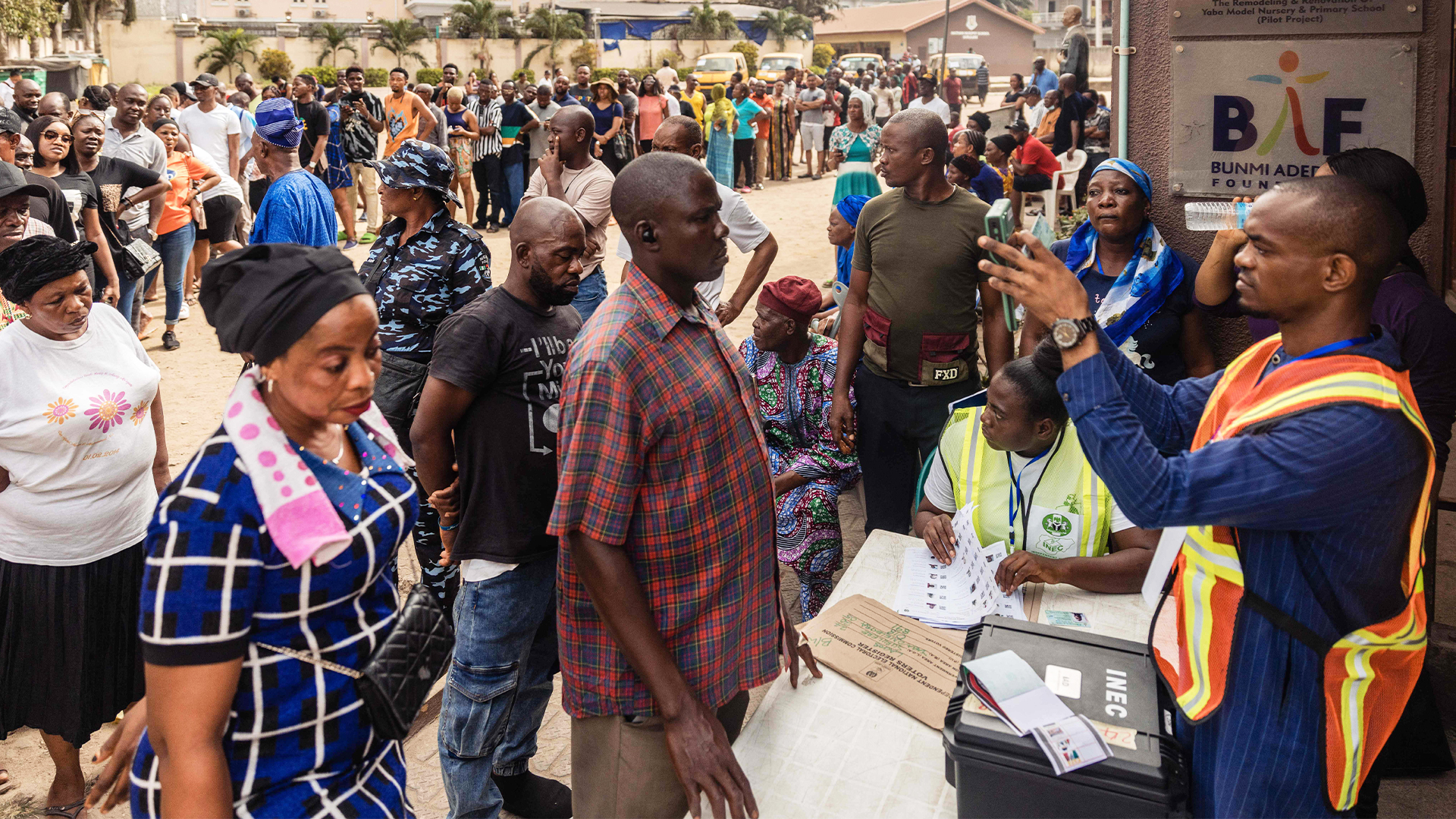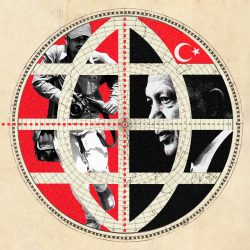
BENSON IBEABUCHI/AFP via Getty Images
Nigeria’s digital vote-counting failure decimated public trust in elections
After a long day of voting, the exercise came to an end at a polling unit in Gwarinpa, an estate in Nigeria’s capital city, Abuja, at 2:30 p.m. Or so voters thought. Electoral officers began to tally the votes and input the numbers into a web-based, centralized election results viewing portal. But what was supposed to be a relatively straight-forward process stretched on until it was nearly midnight.
Several voters had waited to ensure that the process — a digitized election tally, the first to be used in a nationwide election in Nigeria’s history — was complete and sound. After hours of waiting, their patience evaporated. Some began to accuse the officers of sabotage.
“The e-transmission application was not properly configured on the device, so we could not upload the [tally],” said Bolaji Abdulganiyu, one of the officers on duty. The small team at the polling unit was unable to transmit the votes through the digitized system, as stipulated by the Independent National Election Commission’s new and highly-touted guidelines. Instead, they had to carry the sheets to the election commission’s IT center by hand.
Abdulganiyu was expecting the new voting and identity verification system to work better. “We were very confident because we had training,” he said. “It worked perfectly.” But when the votes actually began coming in, the system began to crash under their weight.
The problem Abdulganiyu and his colleagues were trying to solve was playing out nationwide. Throughout the day and into the night, the centralized system buckled and machines malfunctioned at various polling places across the country, frustrating the millions of voters who had gone to the polls expecting to choose a successor to President Muhammadu Buhari, who will soon reach the end of his two-term limit.
A voter from Onishita, in eastern Nigeria, told me that the machine at her polling place began malfunctioning due to overheating. “[Voters] had to contribute money to get fuel for a generator to power some fans to cool the machine,” said Stephanie, who was only willing to share her first name.
Four days after polling day, Nigeria’s election commission called the election for Bola Tinubu, the candidate for the ruling All Progressives Congress party, despite having uploaded only 30% of votes. Officials claimed that a full manual count had taken place but only 30% of the results could be seen through the digital system. The announcement sparked widespread anger among citizens and analysts alike, as they decried the lack of transparency and accused election workers of tampering with the results.
Nigeria’s election commission had promised that digitization would make for a safer, more transparent and fair election, but it has done the opposite. The country’s recently updated electoral law encouraged digitization and allowed the commission to introduce the Bimodal Voter Accreditation System, a system that verifies registered voters and is intended to prevent over-voting but also includes digital applications for transmitting vote tallies.
The system’s failure on election day blew a hole in the already-beleaguered election that was fraught with polls opening late, long delays to vote and violence in many parts of the country. It has undercut people’s confidence in the vote count and helped to fuel a scourge of misinformation online about who may or may not have won. And it has set the stage for a court battle between opposition parties and the ruling party, which was declared the winner.
Fadekemi Abiru, an expert at the Lagos-based intelligence company Stears Intelligence, explained that the election commission had sought to minimize manipulation by streamlining the process. Prior to this election, results were counted at polling units, transferred to the ward and then to a local government office. The local government would then deliver those counts to the state and then onto the federal body for a full count to render a final result.
“Along the way, there is a lot of manipulation that could happen. They were trying to cut out that part and make that a bit more digitized,” Abiru said. “But it was quite uncanny that the next day, we were looking at the portal, and it was less than 10% of the results that had been uploaded, so that was a cause of alarm.”
In some cases, there were incidents of electoral officers uploading selfies or posting results for states other than their own. This became a theme among the critiques that Nigerians posted on social media.
“The objective was transparency, but I don’t think it lived up to that expectation,” Abiru said.
Several local and international election observers have also condemned the election process. An international observer mission stated that “the Electoral Act 2022 introduced much-needed reforms aimed at increasing transparency in results collation and timely organization of pre-electoral processes; however, the elections still fell well short of Nigerian citizens’ legitimate and reasonable expectations.”
Experts say that the effort to use technology in Nigeria’s electoral process is commendable, but until the country’s corruption record improves, it will be difficult to increase trust in election processes. Abiru described Nigeria as a “low-trust society” and explained that people are generally wary of technology.
“Nigeria’s electoral umpire isn’t only eroding trust in itself, it’s also giving tech a bad name,” wrote tech policy leader G’benga Sesan on Twitter.
Nigerians will go to the polls again in the near future to elect governors and state legislature members. The elections have been postponed further due to the electoral commission’s court request to reconfigure the voter accreditation system machines. Nevertheless, for millions of Nigerians who had expected an improved election, the damage is done.
Looking ahead, the question remains whether the system can be fixed and made to work properly when it actually needs to. “I think [the commission] put in a good infrastructure and arrangement but the implementation [was] the problem,” said Ismail Bello, a digital technology expert.
Over 300 billion naira (about $652 million) was budgeted to hold general elections. Of the 93 million registered voters in Nigeria, only 24.9 million people appear to have voted, marking the worst turnout in Nigeria’s electoral history.
For that amount of money, Bello said, “I expect them to have a very good portal. Technology will only do what you ask it to.”
The story you just read is a small piece of a complex and an ever-changing storyline that Coda covers relentlessly and with singular focus. But we can’t do it without your help. Show your support for journalism that stays on the story by becoming a member today. Coda Story is a 501(c)3 U.S. non-profit. Your contribution to Coda Story is tax deductible.
















